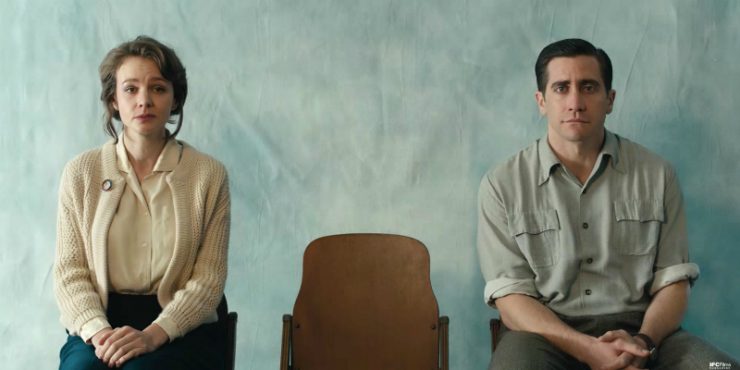Literature is littered with novels about white people betrayed by the post-war society. At a time when the American government was doing more than they ever had to invest in its people, lots of minorities fell through the cracks – and some of the whites did too. In Wildlife – Paul Dano’s directorial debut – Carey Mulligan and Jake Gyllenhaal play Jeanette and Jerry Brinson, a married couple living in Montana. Both white, and beautiful enough to be noticed, it would seem particularly cruel that they can’t seem to punch their ticket into the middle class. They toil away in service jobs, shining shoes and teaching swimming lessons. More than that, they are dogged by disappointment and self-loathing. At a time when America was defining itself by its triumph, they’re beginning to be defined by their failure.
They have a son, Joe (Ed Oxenbould), in high school, but both seem too distracted to truly notice him. Jerry wants Joe to play football, while Jeanette wants him to focus more on his studies and maybe get a job. This disagreement is representative of a much larger problem: Jerry is frustrated that Joe doesn’t covet his high school football glory days while Jeanette is frustrated that Joe would want to do anything other than to leave his tenuous, lower-class home and never come back. When Jerry loses his job at a golf resort over a trivial matter, he becomes obsessed with his status in the household. He decides to join a group of men fighting a dangerous wildfire outside of town, a decision that is the final straw for Jeanette, proof that Jerry values his pride and masculinity over his family and his own safety.
With Jerry gone, Jeanette’s caring attention spills over into resentment and spite. She picks fights with Joe, lies about her whereabouts and begins a relationship with a rich war veteran named Warren Miller (Bill Camp). Warren’s motives are foggy, but they’re clear enough to Joe. Trying to continue a successful student career, as well as tackling a part-time job with an in-town photographer, Joe struggles mightily while trying to monitor Jeanette’s senseless acting out. As the situation becomes more and more untenable, Jerry returns, and Joe learns that neither of his parents is emotionally prepared for the demise of their marriage. They’re failure to achieve the American Dream is an existential one, a kind of death that presents the parents with a devastating reality: they bought into a specialness that was never really there.
There is such an astonishing richness to the filmmaking here. Working with cinematographer Diego García, Dano crafts a lush narrative of Sirk-ian grandeur without the slabs of melodrama. Working from a script he wrote with his personal/professional partner, Zoe Kazan, Dano does the best thing that a first-time director can do: support the characters. Their film is littered with Middle American confusion, a desperation in learning that they must work to earn what they thought was already rightfully theirs. Everything that Dano and García produce cinematically contributes to these feelings and these characters, and it shapes how we think about their behavior. Its slick, sepia tint gives beauty to the barren Montana landscapes, and creates a ferocity within the attempted domesticity inside the Brinson home.
Ed Oxenbould’s Joe is a quiet, self-reliant kid who quietly wishes that reliance could still be with his parents. The crumbling image of his parents is a tragic development, but Oxenbould is good enough to know that a high school kid would hardly show it. Gyllenhaal shows again a penchant for expressiveness and aggression, a lack of fear when confronting the rage of his characters. But it is mostly Mulligan who gets the choice sequences and monologues (though Bill Camp does breathtakingly good work in a very little amount of time). Since An Education, Mulligan has stayed away from the parts of dainty naïveté, preferring to show rougher edges. Wildlife is perhaps the best, most mature result of that, and the film takes advantage of Mulligan’s talent for finding humanity wherever it may be. Her Jeanette is impulsive without the gifts of improvisation, and it results in her own self-hatred. In all her attempts to hurt the men in her life, she always finds herself the biggest victim.
I mentioned race at the start of this review, because I feel like the idea of whiteness is thoroughly imprinted all over this film. Joe Brinson’s coming of age is filtered entirely through the irresponsibility of his parents, and their lacking is based on a disappointment of missing out on what all whites were supposed to partake in. Wildlife has little interest in the fact the minorities saw very little from this lucrative American period (in fact, it simply has no minorities at all), but instead plants the seeds of an angry group of people, unable to take advantage of their country’s boastful prosperity. This is not a film about race, but I couldn’t help but think about it the entire time. In a way, Dano has made a film about how whiteness as we know it today is created, and how those feelings of expectation and superiority gestate. He’s also made a devastating family drama, with emotion that could ripple through any home.
Directed by Paul Dano










